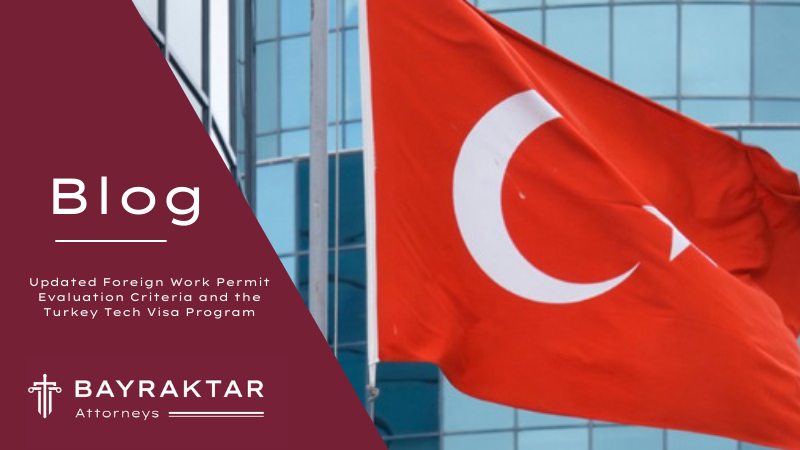
On October 1, 2024, the Ministry of Labor and Social Security – Directorate General of International Labor – announced an update to the Work Permit Evaluation Criteria, based on the supplementary provisions of the Implementation Regulation of the International Workforce Law.
The update, which took effect on the same date, introduces significant revisions to the evaluation criteria for work permits, focusing on key areas such as employment, financial adequacy, and wage requirements. Additionally, the update includes specific regulations tailored to certain industries, professions, and job roles.
Furthermore, an announcement was made regarding the Turkey Tech Visa Program, a special initiative aimed at inviting highly skilled professionals in technology and startups engaged in innovative and tech-driven ventures. Below is a summary of the key updates:
A) Work Permit Evaluation Criteria Announcement
General Evaluation Criteria:
Employment Criteria:
Companies with net annual sales of at least 50,000,000 Turkish Lira will be exempt from the employment criteria for up to five foreign employees.
This means that the requirement to employ a certain number of Turkish nationals for each foreign worker will not apply to the first five foreign employees. However, from the sixth foreign employee onward, the employment criteria must be met.
For companies that do not meet this threshold, the standard rule applies, requiring the employment of at least five Turkish nationals for each foreign worker.
Financial Adequacy Criteria:
For newly established businesses subject to balance sheet-based accounting (but which have not yet prepared a year-end balance sheet or annual income statement), the minimum paid-in capital must now be 500,000 TL.
| Old Requirement |
| Minimum Paid-in Capital: 100,000 TL |
| New Requirement |
| Minimum Paid-in Capital: 500,000 TL |
For existing companies (those with at least one year-end balance sheet and annual income statement) and partnerships, the updated thresholds are:
| Old Requirement | |
| Paid-in Capital: 100,000 TL | |
| Net Sales: 800,000 TL | |
| Export: 250,000 USD | |
| New Requirement | |
| Paid-in Capital: 500,000 TL | |
| Net Sales: 8,000,000 TL | |
| Export: 150,000 USD |
While the thresholds for paid-in capital and net sales have been increased, the export requirement has been reduced.
Note: These financial adequacy changes will come into effect on January 1, 2025. Until then, applications will continue to be assessed based on the previous lower limits.
Wage Criteria:
The wage criteria for foreign workers have also been revised as follows, based on the gross minimum wage in effect at the time of the work permit application:
| Job TitleOld Minimum Wage (Gross)New Minimum Wage (Gross) | ||
| Senior Executives & Pilots | 6.5 times the minimum wage | 5 times the minimum wage |
| Engineers & Architects | 4 times the minimum wage | 4 times the minimum wage |
| Other Managers | 4 times the minimum wage | 3 times the minimum wage |
| Specialists | 3 times the minimum wage | 2 times the minimum wage |
| Other Professions | 1.5 times the minimum wage | Minimum wage |
| Domestic Workers | Minimum wage | Minimum wage |
Exemptions from Employment and Financial Adequacy Criteria:
Foreigners who have held a residence permit (excluding student types) or a work permit in Turkey for at least three of the last five years, including under international protection, will be exempt from the employment and financial adequacy criteria for up to three foreign workers in a company. However, the number of foreign workers cannot exceed the number of Turkish employees.
If more than three foreign workers are employed, the standard criteria will apply from the fourth employee onward.
Sector-Specific Employment Criteria:
- Information Technology (IT) Sector: Foreign employees specializing in software development, database management, or mobile software development are exempt from the employment and financial adequacy criteria for up to two foreign workers.
- Domestic Services Sector: Foreign domestic workers employed through a work permit obtained abroad will not be allowed to change employers within Turkey for six months.
- High-Tech Sectors: For investments that make a significant contribution to the economy or create substantial employment, or in cases where no qualified Turkish professionals are available for the job, the employment and financial criteria may be partially or fully waived.Foreign workers in R&D and design roles in companies with R&D Center or Design Center certificates, or those working in technology development zones, will require the approval of the Ministry of Industry and Technology for work permit applications. Employment and financial criteria will not apply to these workers.
- Public Projects: Foreign employees working on projects under bilateral or multilateral agreements or public tenders will not be subject to the employment or financial adequacy criteria.
Work Permits for Foreign Company Partners:
For foreign nationals establishing or partnering with a company, the work permit evaluation will require:
- A minimum paid-in capital of 500,000 TL (up from 40,000 TL).
- The foreign partner must hold at least a 20% share in the company, with a minimum contribution of 500,000 TL.
Note: Until January 1, 2025, the minimum required capital for a foreign partner will remain 40,000 TL. After that date, the new threshold of 500,000 TL will apply.
B) Turkey Tech Visa Program
The Turkey Tech Visa Program offers a range of incentives for foreign talent and startups in the technology sector. Key benefits include:
- 3-Year Work Permit: The program aims to facilitate the transfer of foreign employees to Turkey for foreign investors and companies.
- Office Space in Technoparks: Startups can easily secure office space in one of the approximately 100 technoparks across Turkey.
- Tech Visa Fund: Financial support will be available for startups participating in the Tech Visa Program.
- Access to Government Grants: Startups can access various government grants, including funding for branding, international market entry, and project financing.
- Tax Incentives: Several tax exemptions are offered, including VAT, corporate tax, customs duties, and income tax.
- Free Access to Healthcare: Social security premiums for employees of tech companies will be covered by the state, allowing them to access public healthcare services free of charge.
These updates mark a significant shift in Turkey’s approach to foreign labor and tech innovation, creating new opportunities for both skilled professionals and entrepreneurs.
Stay tuned for more insights from Bayraktar Attorneys as we continue to provide expert legal guidance on these evolving regulations.







